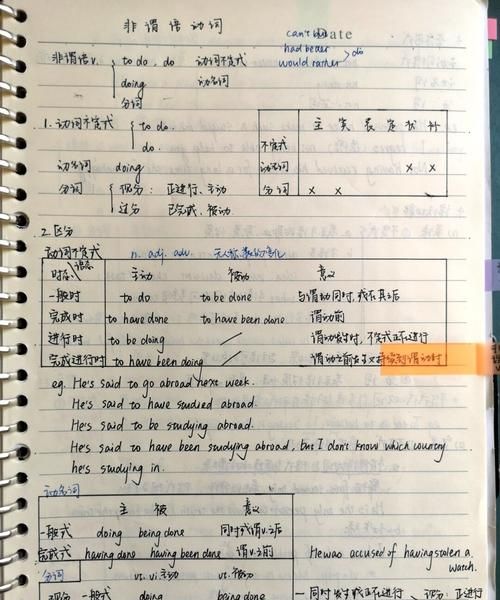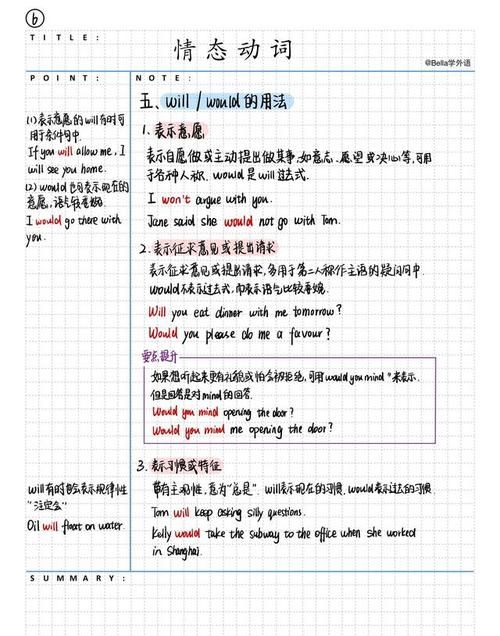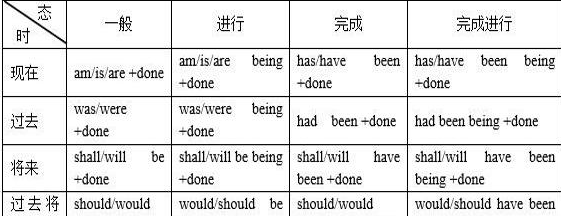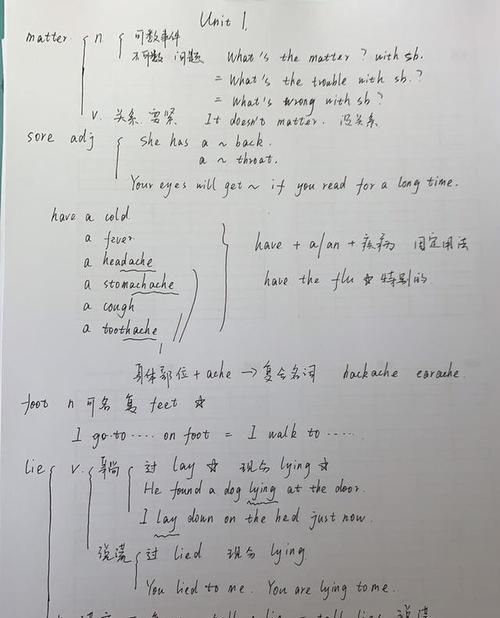本文目录
初中英语的语法知识点总结
动词,就是表示动作和状态的词。根据其在句中的功能,动词可分为四类,分别是:实义动词、系动词、助动词、情态动词。下面是我为大家整理的关于初中英语动词的知识点 总结 ,希望对您有所帮助。欢迎大家阅读参考学习!
一、实义动词
实义动词又叫行为动词,分成及物动词和不及物动词 。
1、及物动词是必须带宾语的动词,可分为如下两类。 1) 及物动词+宾语例:I love my home. 我爱我家。 He bought an English dictionary. 他买了一本英语词典。 2) 及物动词+间接宾语+直接宾语例:She taught us maths. 她教我们数学。 My mother gave me a new pen. 母亲给了我一支新钢笔。提示:常用的能接双宾语的及物动词有:give, teach, buy, lend, find, hand, leave, sell, show, read, pay, make, offer, build, pass, bring, cook等。
2、 不及物动词不及物动词不需要跟宾语,本身意义完整。例:She came last week. 她上周来的。 It is raining hard. 正下着大雨。 Class began at half past seven. 7点半开始上课。 What happened yesterday? 昨天发生了什么事?
3、同一动词有时可用作及物动词,有时可用作不及物动词。例如:She can dance and sing. 她能 唱歌 又能跳舞。(sing在此用作不及物动词。) She can sing many English songs. 她能唱好多首英文歌曲。(sing用作及物动词。)
二、系动词
系动词不能单独作谓语,后面必须跟表语构成合成式谓语。表语通常由名词、形容词,或相当于名词或形容词的词或 短语 等充当,说明主语是什么或怎么样。连系动词有 be, seem, look, become, get, grow, feel, appear, remain, turn。
例如: The story sounds true. Those oranges taste good.
三、助动词
协助主要动词构成谓语动词词组的词叫助动词。 助动词自身没有词义,不可单独使用,只能在实义动词和系动词前构成谓语的时态、语态以及否定式和疑问式。它没有对应的汉译,例如: He doesn't like English. 他不喜欢英语。 (doesn't是助动词,无词义;like是主要动词,有词义) He is singing. 他在唱歌。(is是助动词,无词义,构成现在进行时)
四、情态动词
情态动词是一种本身有一定的词义,表示说话人对有关行为或事物的态度和看法,认为其可能、应该或必要等,不能单独作谓语,情态动词后面加动词原形。情态动词无人称和数的变化, 情态动词后面跟的动词需用原形,否定式构成是在情态动词后面加 "not"。
常用的情态动词有 :
Can(could) (能,会) 如:I can swim. 我会 游泳 。
May(might) (可以) 如: You may go now. 你现在可以走了。
Must (必须) 如:You must do your homework. 你必须写作业。
Need (需要) 如:He needs our help. 他需要我们的帮助。
注意:1、情态动词表推测在肯定句中一般用must (一定),can, could(可能),might /may(也许,或许)。否定句中用can’t / couldn’t(不可能)。
例如:
It can’t be the headmaster. He has gone to America. 这不可能是校长,他去美国了。
2、can和could表示允许的用法:表示现在的允许时,若是请求别人允许自己做某事,两者均可用,但用could 语气更委婉;若是自己允许别人做某事,一般只用 can,而不用 could。如: Can [Could] I come in? 我可以进来吗?
3、must和have to的用法 表示必须、必要。(must表示主观多一些而have to则表示客观多一些)如: You must come in time. 你必须及时过来。
回答must引出的问句时,如果是否定的回答,不能用mustn't,而要用needn't或don't have to。 — Must we hand in our exercise books today? — Yes, you must. (No, you don’t have to.) —我们今天必须交上练习册吗? —是的。(不,不必。)
4、need表示“需要”或“必须”,作情态动词时,仅用于否定句或疑问句中,后跟动词原形。Need还常用作实义动词,有时态、人称和数的变化,后面通常接名词、代词和带to的不定式,
Do you need a dictionary? 你需要词典吗?
You needn't give it back before Friday. 你不必在星期五前还我。
常见考法
对于动词的考查,通常会在单选,词语运用和完形填空中出现。除了考查时态和语态外,只要考查实义动词的固定短语,系动词和情态动词的灵活运用。
典型例题:--Must I return the magazine to you right now,Sandy/
--No,you .you may keep it until next Wednesday.
A. needn't B. can't C. must D. may
解析:本题考查情态动词must构成的疑问句的回答方式。否定回答应该用 needn't 。
答案:A
误区提醒
汉语和英语的动词有较大差异,而学习者在学习是往往容易套用汉语,从而混淆意思相近而用法不同的词或词组,也容易混淆词形相近而意思不同的词或词组,例如look for和find, listen和 hear。所以我们在学习中要认真分析不同的词或词组。
典型例题:They had to ___the 800--meter race because of the bad weather.
A put on B put off C get on D get up
解析:本题考查四个动词短语的区别。put on “穿上,戴上”; put off“推迟”; get on “上车”; get up“起床”。根据语境,应选put off。
答案:B
相关 文章 :
1. 初三全程英语知识点总结
2. 初中英语动词知识点:动词中的种类
3. 初中英语基础知识归纳笔记
4. 初中的英语知识点总结
5. 初一英语知识点总结

初中英语感官动词的用法
学好了动词,就相当于学好了英语。的确是这样,英语动词在初中阶段可谓举足轻重。那么接下来给大家分享一些关于初中英语常用的动词用法,希望对大家有所帮助。
初中英语常用动词用法:
1. allow sb. to do sth. 允许某人去做某事
My father allowed me to go out for a walk after finishing my homework.
2. asked sb. (not) to do sth. 叫某人做事某事(叫某人不要去做某事)
My father asked me to study hard.He asked me not to swim alone.
be asked to do sth. 被叫去做某事/被邀请去做某事
I was asked to have a dinner with them yesterday.
3. be afraid to do sth. 害怕做某事She is afraid to ask me questions.
4. be afraid of doing sth. 害怕做某事I am afraid of going out at night.
5. be afraid of sth. 害怕某物He is afraid of snakes.
6. be amazed to do sth. 对做某事感到惊讶He was amazed to meet the girl there.
be amazed at sth. 对某事感到惊讶they were amazed at the news
7. be busy doing/with sth. 忙于做某事 (常考)
e.g: I was busy washing my car at that time. 那时候我正忙于清洗我的车子。
I am busy with my work.
8. be coming/going/leaving/flying/moving/dying(某些位移动词用进行时态时表将来)
the bus is coming/the dog is dying.
9. be excited to do sth. 对做……感到兴奋
Jacky was excited to travel there by plane.
be excited at sth.
Lily was excited at his words.
be excited about doing sth.
he was excited about passing the exam without going overing books.
10. be frightened to do sth. 害怕去做某事
Sam is frightened to ride a horse.
11. be glad/happy to do sth. 高兴去做某事
she is happy to clean the blackboard with me.
be pleased to do sth. 高兴做某事
she was pleased to help the old man yesterday
be pleased with sth. 对某事感到高兴/满意
the teacher was pleased with my answer.
12. be interested in sth./doing sth. 对某事感兴趣/对做某事感兴趣
she is interested in swimming in the river.
My brother is interested in Chinese.
13. be/get ready for/to do sth.Be ready for sth. 为某事做好了准备
We are ready for the exam.Be ready to do sth. 为做某事做好了准备
We are ready to have a birthday party for her.
get ready for sth.为某事在做准备
We are getting ready for the exam.
13. be sorry to do sth. 对做某事感到抱歉
14. be surprised to do sth. 对做某事感到惊奇
be surprised at sth. 对某事感到惊奇
15. be worth doing sth. 值得做某事 (worth 后接动词-ing形式,常考)
16. begin to do sth.begin/start to do/doing sth.
17. can/be able to afford (to buy) sth. 有能力购买(供)……
18. can/may/must do sth. could/would/should/might do sth.
19. can't wait to do sth. 迫不急待地去做某事
20. decide to do sth. 决定去做某事
make up one's mind to do sth. 下决心去做某事 (常考)
make a decision to do sth. 对做某事作出决定
21. deserve to do sth. 值得/应该做……
22. encourage sb. to do sth.鼓励某人去做某事
23. enjoy doing sth. 乐意去做某事
24. expect (sb.) to do sth. 期望去做某事
25. fail to do sth. 做某事失败succeed doing sth. 成功做了某事
26. finish doing sth. 做完某事(后接动词-ing形式) (常考)
27. follow sb to do sth. 跟随某人去做某事
28. get sb. to do sth.make sb. do sth.let sb. do sth.
29. get/have a chance to do sth.得到一个做某事的机会
30. give/pass/show/lend/sell sb. sth./ sth. to sb.buy/get/bring sb. sth. / sth. for sb.
31. go on to do sth. 继续做事(常考)
go on doing sth. 继续做事(常考)
32. hate to do/doing sth. 讨厌/不喜欢做某事
33. have fun doing sth.
34. have problems doing sth.做某事遇到困难
35. have sb. do sth.have sth. donehave sth. to do 有事要做
36. hear sb. do sth. 听到某人做某事(后接动词原形,常考)hear sb. doing sth. 听到某人正在做某事(常见)
37. help to do sth. 帮忙做某事help sb. (to) do sth. 帮助某人做某事
38. hope/wish to do sth. 希望做某事wish sb. to do sth. 希望某人做某事
39. I t seems that 这像是……(后接从句)seem to do sth.seem +adj.
40. It's + adj.+(for sb.) to do sth.
It's + adj. +(of sb.) to do sthe.g: It's glad for him to hear the news.
41. It takes sb. some time/money to do sth. 花费某人多长时间做某事(常考)
42. pay …for…costspend…on…..it take …to do sth.
43. It's best for sb to do sth.. 对某人来说做某事是最好的
had better do sth. 最好做某事 (注意had没有时态和人称的变化,better后接动词原形)
44. It's time for sb. to do sth. 是某人做某事的时候了
45. keep (on)doing sth. 坚持做某事(常考)keep sb. doing sth. 让某人做某事(常考)
keep sb. from doing sth. 阻止某人做某事(常考)keep sb./ sth. +adj.
keep the book for 2 days 借这本书两天(不要用borrow或lend)
46. learn to do sth. 学做某事learn sth. from sb. 向某人学习
47. like to do/doing sth. 喜欢做某事like sb. to do sth. 喜欢某人做某事
48. need to do sth.need doing sth./to be doneneed sth .needn't do sth.
49. prefer to do sth. rather than do sth. 宁愿……而不愿……(常考)
prefer doing sth. to doing sth. 喜欢做……胜过做……
e.g: I prefer reading books to going shopping. 比起购物来,我更爱读书。
prefer to do sth. 喜欢(爱)做某事
50. refuse to do sth. 拒绝做……
初中英语动词固定搭配:
1. want to do sth. 想要做某事
I want to buy a new computer this afternoon.
我想今天下午买台新电脑。
2. would like to do sth.想要做某事
I would like to invite you to come to my birthday party this Saturday.
我想邀请你这周六来我的聚会。
3. wish to do sth. 希望做某事
I wish to live on the moon one day.
我希望有一天在月球上生活。
4. help to do sth. 帮助做某事
I often help to do some chores at home.
我在家经常帮着做家务。
5. hope to do sth. 希望做某事
I hope to have a good rest this weekend.
我希望这周末好好休息一下。
6. learn to do sth. 学会做某事
He finally learned to play the piano with the help of the teacher.
在老师的帮助下,他最终学会了弹钢琴。
7. manage to do sth. 设法做成某事
They managed to escape the fire yesterday.
昨天他们设法逃脱了火灾。
8. offer to do sth. 主动提出做某事
Never offer to teach fish to swim.
别在强人面前逞能。
9. plan to do sth. 计划做某事
He plans to travel around the world.
他计划要周游世界。
10. afford to do sth. 负担得起做某事(时间或金钱方面)
We can’t afford to go abroad this summer.
今年夏天我们没有足够的钱 出国 。
11. agree to do sth. 做某事
He agreed to do it at once.
他同意立刻行动。
12. arrange to do sth.安排做某事
I arrange to wash clothes tomorrow morning.
我安排好明天上午洗衣服。
13. ask to do sth. 要求做某事
The boy asks to go to school by bike.
这个男孩要求骑自行车去上学。
14. beg to do sth. 恳求做某事
He begged not to be put into prison.
他祈求不要被关进监狱。
15. care to do sth. 愿意/喜欢做某事
16. choose to do sth. 选择做某事
He chose to believe what she had said.
他选择相信她说的话。
17. decide to do sth. 决定做某事
She has decided to travel all over the world.
她已经决定周游世界了。
18. demand to do sth. 要求做某事
19. determine to do sth. 决心做某事
He determined to learn French.
他下定决心学习法语。
20. expect to do sth. 等待做某事
I am expecting to hear from you soon.
我期待着早点收到你的来信。
21. fear to do sth. 惧怕做某事
She fears to live on the mountain.
她害怕住在山上。
22. prepare to do sth. 预备做某事
They prepared to go hiking this Sunday.
他们准备周日去远足。
23. pretend to do sth. 伪装做某事
She pretended not to see me.
她假装没有看到我。
24. promise to do sth. 答应做某事
I have promised to give the children some books.
我已经答应给孩子们一些书了。
25. refuse to do sth. 拒绝做某事
She refused to buy a new cellphone for her boy.
她拒绝给她儿子买新手机。
初中英语常用动词注意事项:
一、主动表被动的情况
1. 感观系动词,look, seem, sound, feel, smell, taste等
eg. The fish tastes nice.
2. measure, weigh等表示度量的动词。
eg. The elephant weights nearly a ton.
3. wash, clean, open, sell, read, last, write, steer等不及物动词可以表示被动意义。eg. The ship steer easily.
二、被动句表示主动含义。
She was dressed in a red skirt.
此类动词常见于dress, seat, devote, adapt, accustom 等后面可以接反身代词的动词。
二、时态,语态
1. 用进行时表示一种情绪。
She is always helping others.(表赞扬)
The man is always smoking in the office, which offends others very much.
2. 一般过去时表示某一动作已完成,过去进行时表示动作可能未完成。
He wrote a letter yesterday morning.(信已写完)
He was writing a letter yesterday evening. (信可能还未写完)
3.现在完成时可表示动作持续至今,一般过去时则表示动作已结束,并不强调对现在造成的影响或结果。
I have lived in this street.(我一直住这条街上)
I lived in this street.(我曾住在这条街上)
4.表示几个连续动作时,尽管有先后,仍要用相同时态。
He came into the classroom, put down the book and wrote a few words on the blackboard.
5. 在条件和时间状语从句中常用一般时表示将来。
6.叙述过去发生的某件事情常用一般过去时,表示过去某个时间或动作之后发生的事情才用过去将来时,过去某个时刻/段内正发生的事情,才用过去进行时,过去某个时间或动作之前发生的事情才用过去完成时。因此找准时间的参照点,是正确运用时态的关键。
7.罗列并熟记各种时态的被动形式。
三.动词的类别与特征中的注意点
1.兼作Vt., Vi.的动词
(1)对兼作Vt., Vi.的动词,要注意根据不同的情况选择使用。
The children are flying their kites in the square.( Vt.)
We saw a plane flying high up in the sky.( Vi.)
(2)有些动词后跟从句时为Vt., 其它 情况为Vi.,但意义基本不变。典型的有wonder, think, insist, agree,等。
The headmaster insisted that the students should wear school uniforms .
The headmaster insisted on the students wearing school uniforms.
(3)有些动词在Vt. Vi.之间,意义有所不同。如run, stand, lie等
She stood alone under the tree.
I can’t stand such cold weather.
2.常用的双宾动词有give, teach, lend, bring, explain, send, offer, pay, sell, buy, tell, show, write, ask, wish, read等,这些动词都带有一定的趋向性。因此转换成带介词的情况时,常可用for , to 来转换。
注意:explain sth. to sb.=explain to sb. sth., describe sth. to sb.=describe to sb. sth.
3.带宾补的动词,注意宾补的逻辑主语是动词宾语
宾补常是名词、形容词、介词 短语 ,副词和非谓语动词等。常见的此类动词有make, have, let, get, keep, find, see, feel, notice等,但要注意不同的动词有不同的接法。
He kept the children (keep不能用不定式作宾补)
Make…do, have…do/doing/done,get…to do/done, find…doing/done, leave…to do/doing/介词短语/a./ad., see…doing/do/done
4.后面常接-ing的动词及短语:suggest, finish, avoid, can’t help, mind, need, enjoy, require, postpone, delay, practice, fancy, excuse, pardon, advise, consider, deny, admit, endure, escape, miss, appreciate, dislike, have a good time doing, put off, call off, give up
5.有些动词后面接to do 和-ing时意义基本相同,而有的则完全不同,要注意
Love, like, hate, forget, remember, stop, begin, start, continue, prefer, regret, intend, mean, want, need, require, neglect, try, deserve, can’t bear等
6.注意状态动词和动态动词的选用
Mother asked the son to notice his manners at the party. (notice就改为mind)
再如:listen/hear, look/see, look for/find, advise/persuade, marry/be married, join/be in等。
7.注意have表“有”时,及系动词一般不能用进行时态。
8.注意表示“有”时,have与there be 的选用
9.注意动词词组分类(见<零距离>),尤其要注意各类动词词组的使用特点及有的动词词组的主被动转换使用。
Make use of sth→sth is made use of(介词不要掉了)/use is made of sth.
10.Hope, intend, expect, plan, want, think, mean 等动词用过去完成时表示没有实现的愿望,计划,打算等
初中英语常用的动词用法相关 文章 :
★ 初中英语动词的知识点总结
★ 初中英语动词知识点:Be动词定义及用法
★ 初中英语常用词组有哪些?以及它们的用法是?
★ 初中英语中的常见语法
★ 初中英语语法专题代词与常用动词
★ 初中英语必须掌握的19个重点语法知识点
★ 初中英语情态动词的用法归纳
★ 初中英语动词短语大全
★ 初中英语语法专题动词语常用短语

英语动词知识点归纳思维导图
动词变为动名词的规则: 动词变为动名词,即是动词加ing。
一般情况下,在动词的后面直接加ing。如:play—playing read—reading do—doing go—going;以不发音的字母e结尾的动词,要去掉不发音的字母e。
英语常用动词有have,like,look,speak,talk。
have 英[hæv,həv],美[hæv,həv]
v.有;持有;占有;由…组成;显示出,带有(性质、特征);
aux.与过去分词连用构成完成时;
[其他] 第三人称单数:has现在分词:having过去式:had过去分词:had

扩展资料:
动词通常充当句子的谓语或后接描述性补语充当谓语中心,表示主语的动作、存在、变化,或主语对宾语的动作,态度。如“他来了。”("He arrived")(不及物,表示主语的动态)“我们热爱祖国”("We love our motherland")(主语跟着宾语,表示主语对宾语的态度)
动词可以受副词“不”修饰。只有少数表心理活动的动词和一些能愿动词能够前加程度副词,例如能说“很怕他”、“很喜欢他”、“很羡慕他”。
中文动词通过“V不V”形式构成选择疑问句。相当于英文的“V or not”。
考研英语动词短语总结
常用英语动词短语总结成文,给大家参考。下面是我给大家整理的常用英语动词短语总结,供大家参阅!
常用英语动词短语
set
set up v. 建立;装配;开业;竖立
set out 出发;开始;陈述;陈列
set in vi. 开始;到来;流行
set off v. 出发;引起;动身;使爆炸;抵销;分开
set by 把…留开
set on 唆使;开始;攻击
set up for 自以为;自命为;为…做准备
show
show up 露面;露出;揭露
show in 领入;领人
show off 炫耀;卖弄
sit
sit down 坐下;扎营
sit on 开庭审理;成为…的一员;旁听;列席
sit in 列席,旁听;参加;代理
sit at 坐在…旁边
sit back 休息;不采取行动
sit by 坐视不管,无动于衷
sit around 无所事事
sit up 熬夜;端坐
sit with 临时替人照看
sit for 参加,坐着
sit under 听…讲授;听…说教
sit out 坐在户外;袖手旁观;耐着性子看完或听完
sit through v. 一直挺到结束;耐着性子看完
sit over 坐过去一点;[桥]坐在…的上手
sit down on 反对
sit in on 列席;旁听
常见英语动词短语
struggle
struggle for 为…奋斗;为…争斗
struggle against 与…作斗争,和…斗争
struggle with 与…斗争
struggle on 挣扎下去
suffer
suffer from 忍受,遭受;患…病;受…之苦
suffer for 因…而遭受
suffer through 挨过;熬过
take
take on 承担;呈现;具有;流行;接纳;雇用;穿上
take up 拿起;开始从事
take off 起飞;脱下;离开
take out v. 取出;去掉;出发;抵充
take into 考虑到;说服
take in 接受;理解;拘留;欺骗;让…进入;改短
take away 带走,拿走,取走
take over 接管;接收
think
think of 记起,想起;考虑;想像;关心
think about 考虑
think over 仔细考虑;重新考虑
think for 认为,预料
think back 回想
think on v. 考虑;思量
think up 想出;发明;虚构
必备英语动词短语
speak
speak of 谈到;论及
speak with 和…商量;和…谈话
speak out 畅所欲言;大胆地说;大声地说
speak in 用某种语言说
speak up 更大声地说;无保留地说出
speak for 要求得到;代表…讲话
speak about 说到(谈论)
speak at 指桑骂槐;暗讽
speak on 论及
stand
stand up v. 站起来;坚持;竖立;站得住脚;拥护
stand in 定位替身;代演员站位
stand on 坚持;依靠;位于;拘泥于;[航]持续向同一方向航行 stand for 代表;支持;象征;担任…的候选人
stand out 突出;站出来;坚持到底;坚决反对
stand by 支持;袖手旁观;准备;站在旁边
stand at 达到;踌躇
stand up for 支持,坚持;拥护
stand against vt. 反对;抵抗
stay
stay in 呆在家里;不外出
stay at 暂住在…;保留
stay with 同…住在一起;把…坚持下去;与…并驾齐驱
stay on 继续停留
stay away 外出,不在家
stay away from 躲避;离…远点;不在家
stay up 不睡觉,熬夜
stay for 逗留(…时间);为…而留下
stay out 呆在户外;不回家;持续到...结束
stay out of vt. 置身于……之外
stay by 守在一边;一直支持
stick
stick with 坚持;继续做;保持联系
stick in 在家
stick on 保持在…之上;贴上
stick around v. 逗留;在附近徘徊
stick out 突出;坚持;醒目
stick at v. 坚持;犹豫;努力做
stick up 竖起;伸直;突出
stick into 插入;伸入
stick up for 维护,支持;为……辩护
stick by 忠于;坚持

以上就是关于英语动词总结笔记,初中英语的语法知识点总结的全部内容,以及英语动词总结笔记 的相关内容,希望能够帮到您。

